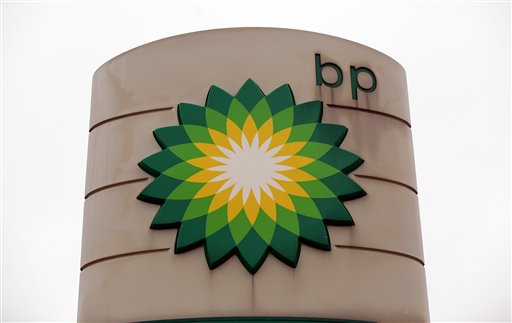BP shares sunk Thursday in London as U.S. politicians pressed the British oil company to halt its dividend payments and fork out greater compensation for American workers and companies devastated by the massive Gulf of Mexico oil spill.
BP shares sunk Thursday in London as U.S. politicians pressed the British oil company to halt its dividend payments and fork out greater compensation for American workers and companies devastated by the massive Gulf of Mexico oil spill.
But markets were also beginning to heed warnings from analysts who said Wednesday's 15.8 percent sell-off of BP shares in New York was an overreaction.
BP shares dropped as much as 11 percent to a 13-year low at the open in London, then recovered some ground by early afternoon, trading 5.1 percent lower at 371.40 pence ($5.42). In the United States, the stock was up 11.6 percent in premarket trading at $3.40.
The share price falls in London and New York have wiped out around half the company's market value since the spill began with an April 20 rig explosion in the Gulf.
BP PLC is finding itself caught in a trans-Atlantic squeeze between an angry U.S. administration and unhappy shareholders, who include hundreds of thousands of retirees in British pension funds.
Prime Minister David Cameron's office said the British leader would discuss the issue with President Barack Obama on a scheduled telephone call over the weekend.
Investors are fretting about the rising costs facing BP after Obama suggested it should also pay unemployment benefits to thousands of oil workers laid off during a moratorium on deep-sea drilling triggered by the spill.
BP tried to reassure investors before the London Stock Exchange opened, saying it was in a strong financial position and it saw no reason to justify the U.S. sell-off, and many analysts agree that the company can withstand the crisis.
But most market experts also acknowledge that the political rhetoric surrounding the accident is outweighing financial fundamentals.
"We don't believe BP has a funding issue, but given the overwhelmingly hostile nature of the U.S. government the company may decide to suspend payments until the wells are capped and the clean-up sufficiently advanced to convince the US that it can afford all the costs as well as pay dividends," said Evolution Securities analyst Richard Griffith. "Unilateral action against BP over its U.S. operations, be it unreasonable or illegal, hangs over BP."
Robert Talbut, the chief investment officer at Royal London Asset Management, a shareholder in BP, said "there is a lot of very irrational and short-term selling going on." But he added that talk of a potential sale of assets or takeover bid — PetroChina Ltd. has been suggested by some as a potential suitor — was not surprising.
"I can understand exactly why someone else would want to buy the BP assets because I think they are grossly undervalued at the moment," he said. "As a shareholder, it's not something I would welcome."
The politics of the spill crossed the Atlantic, with London Mayor Boris Johnson expressing concern Thursday about the "anti-British rhetoric that seems to be permeating from America."
Johnson said BP was paying a "very, very heavy price" for an accident.
"I would like to see a bit of cool heads rather than endlessly buck-passing and name-calling," Johnson told BBC Radio. "When you consider the huge exposure of British pension funds to BP, it starts to become a matter of national concern if a great British company is being continually beaten up on the airwaves."
The influential Financial Times newspaper ran a banner front-page headline "UK alarm over attack on BP."
Cutting the dividend would have a big impact in Britain, where the company accounts for about an eighth of dividend payments from companies in that country's blue-chip stock index, providing crucial income for retirees. In addition, about 40 percent of BP's shareholders are based in the U.S.
BP, which earned more than $16 billion last year, said Thursday the cost of the clean-up and containment efforts had now hit $1.43 billion.
Speaking to investors last week, CEO Tony Hayward wouldn't estimate the total bill, though he told analysts that minority partners in the rig would be expected to pay as well.
BP stressed on Thursday that it had "significant capacity and flexibility" to deal with ongoing costs, underlining its additional cash flow, strong debt to equity ratio and proven reserves.
The company reminded investors that it had indicated in March — before the explosion at the Deepwater Horizon rig — that its cash inflows and outflows were balanced at an oil price of around $60 per barrel.
It said its gearing was currently below the bottom of its targeted range and its asset base was "strong and valuable." The company had more than 18 million barrels of proven reserves and 63 billion barrels of resources at the end of 2009.
Killik & Co. analyst Jonathan Jackson said the shares would remain very volatile until there was a clearer idea of the potential cost but he remained positive on the stock.
"Despite the high risk involved in adding to holdings in the short term and the possibility of a temporary suspension of the dividend, we would continue to do so," he said.
--Associated Press







